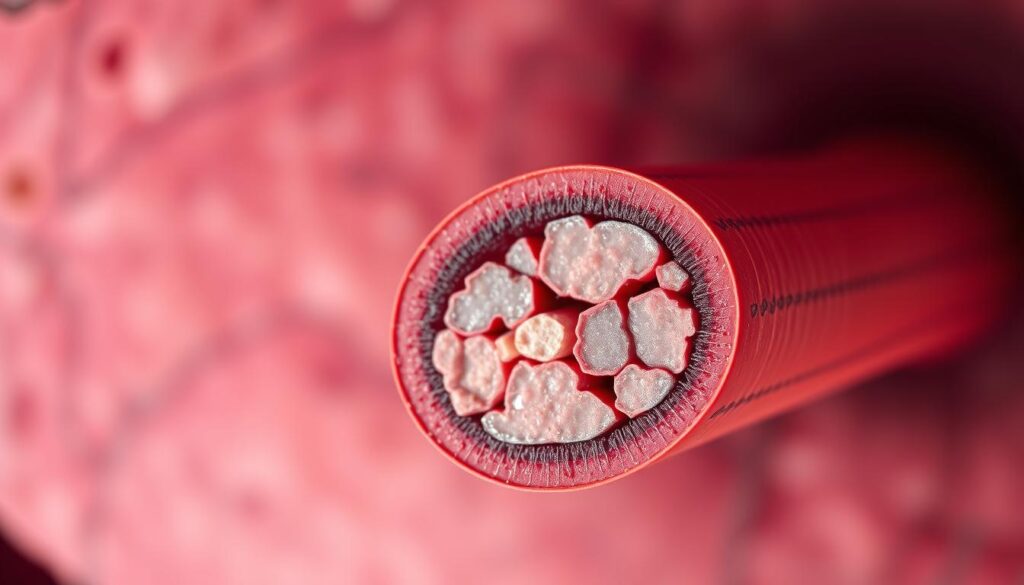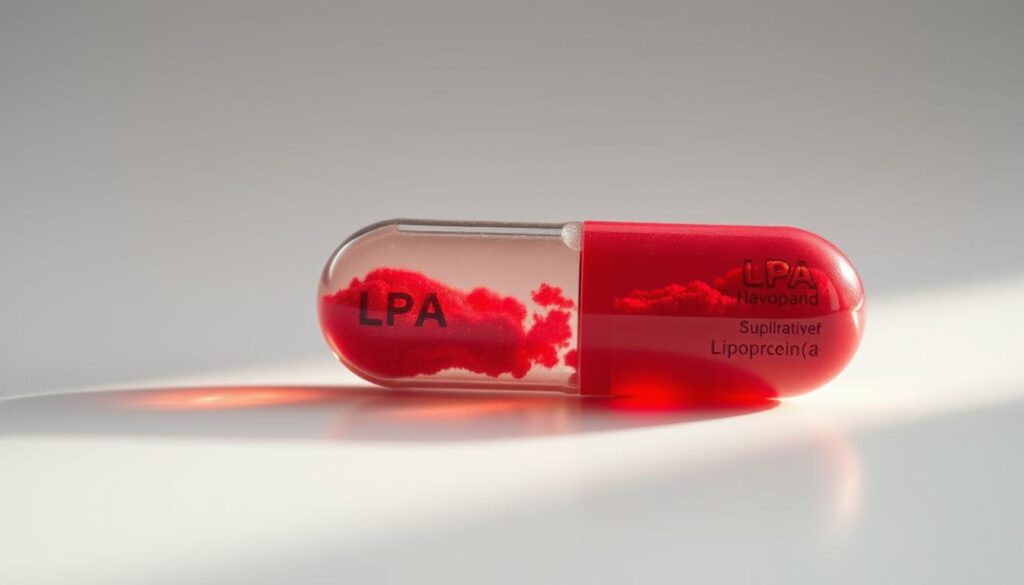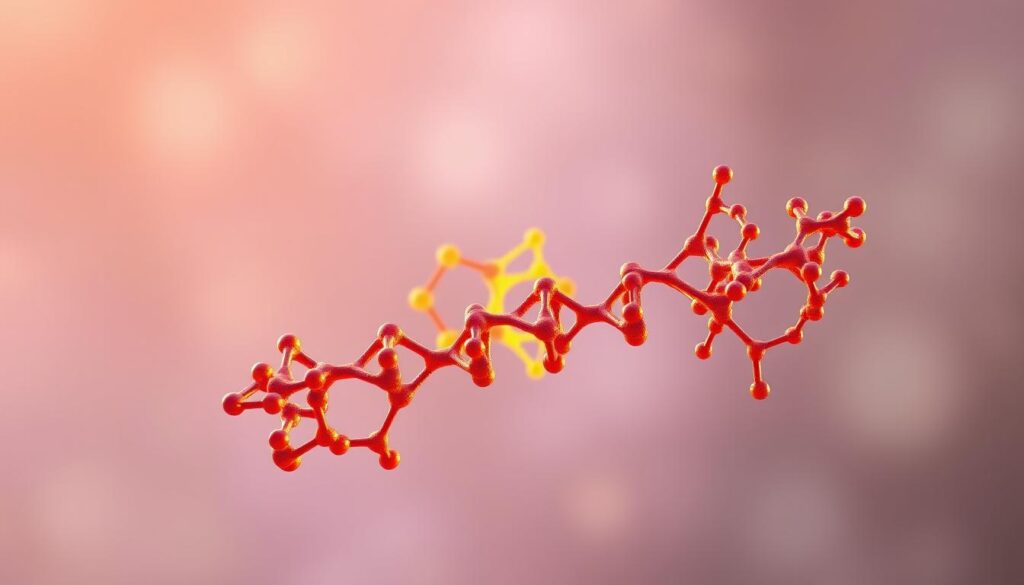Keeping your heart healthy is very important. Two big players in this are Lipoprotein(a) or Lp(a) and Vitamin C. Lp(a) can impact heart health, while Vitamin C is a powerful antioxidant.
Together, they work better than alone to keep your heart strong. Learning how Lp(a) and Vitamin C interact can help you keep your heart in top shape.
Table of Contents
Key Takeaways
- Lp(a) is a lipoprotein that affects cardiovascular health.
- Vitamin C is crucial for its antioxidant properties.
- The combination of Lp(a) and Vitamin C has a synergistic effect on heart health.
- Understanding their relationship is key to maintaining cardiovascular well-being.
- A healthy cardiovascular system is vital for overall health.
Understanding Lipoprotein(a): The Silent Cardiovascular Risk Factor
Lipoprotein(a), or Lp(a), is a mysterious particle linked to heart disease. It carries cholesterol in the blood. High levels of Lp(a) raise the risk of atherosclerosis and heart events.
What is Lipoprotein(a)?
Lipoprotein(a) is like LDL cholesterol but has an extra protein called apolipoprotein(a). This extra protein makes it more harmful to the heart. Studies show high Lp(a) levels increase heart disease risk.
How LPA Differs from Other Cholesterol Types
Lp(a) is different from other cholesterol types. It has apolipoprotein(a) attached, making it unique. Key differences include:
- Lp(a) levels are mostly controlled by genes, making lifestyle changes hard to manage it.
- Lp(a) can cause plaque and inflammation in arteries, increasing heart disease risk.
Genetic Factors Influencing LPA Levels
Genetics play a big role in Lp(a) levels. Changes in the LPA gene affect how much Lp(a) you have. Knowing these genetic factors helps find people at higher risk.
Research on Lp(a) and heart health is ongoing. Studies look at how Lp(a) works with other factors, like vitamin C. This helps doctors find better ways to manage heart risk.
The Essential Role of Vitamin C in Human Health
Vitamin C is key to our health, helping with many body functions. It’s a water-soluble vitamin our bodies can’t make. So, we need to get it from food.
Vitamin C’s Fundamental Functions
Vitamin C helps make collagen, a protein that supports our skin, bones, and connective tissue. It’s also vital for our immune system, helping us fight infections. Plus, it acts as an antioxidant, protecting our cells from harm.
Dietary Sources and Recommended Intake
Adults need about 60-90 mg of vitamin C each day. You can find it in citrus fruits, strawberries, kiwis, and leafy greens like broccoli and spinach.
| Food Item | Vitamin C Content (mg per 100g) |
|---|---|
| Oranges | 53 |
| Strawberries | 59 |
| Broccoli | 89 |
Deficiency and Its Consequences
Not getting enough vitamin C can cause scurvy. Symptoms include tiredness, swollen gums, and joint pain. Linus Pauling, a famous chemist, believed in vitamin C’s health benefits. He suggested taking high doses, which sparked debate but showed vitamin C’s potential in supplements like an lpa supplement.
LPA Cholesterol and Vitamin C: The Scientific Connection
The link between lipoprotein(a) and vitamin C is complex and important for heart health. Research has shown how they interact, which is crucial for understanding heart disease. This connection has been studied a lot, revealing how they work together.
Historical Discovery of the Relationship
Scientists first noticed a link between LPA cholesterol and vitamin C many years ago. They found that vitamin C might help the heart, and LPA cholesterol plays a big role in this. This discovery has led to more research.
Biochemical Interactions
Vitamin C affects many heart health pathways. It fights oxidative stress, which is good for the heart. The way vitamin C and LPA cholesterol work together is still being studied.
Research Findings on Their Synergistic Effects
Many studies have looked at how LPA cholesterol and vitamin C affect the heart together. They found that vitamin C might help counteract LPA’s harmful effects. This is good news for heart health.
| Study | Findings | Implications |
|---|---|---|
| Study on Vitamin C Supplementation | Reduced LPA levels and improved cardiovascular health markers | Potential therapeutic application of vitamin C in managing LPA cholesterol |
| Observational Study on LPA and Vitamin C | Inverse correlation between vitamin C levels and LPA cholesterol | Suggests vitamin C may play a protective role against LPA-related cardiovascular risk |
The connection between LPA cholesterol and vitamin C is deep and involves many areas of study. More research could lead to new ways to keep our hearts healthy.
Linus Pauling’s Pioneering Work on Vitamin C and Heart Disease
Linus Pauling’s research on vitamin C and heart disease was groundbreaking. He was a two-time Nobel laureate who showed vitamin C’s role in heart health. His work opened new paths in studying heart disease.
Pauling’s Vitamin C Theories
Pauling looked beyond vitamin C’s antioxidant benefits. He explored its effects on heart health. He believed high vitamin C doses could lower heart disease risk. This idea was groundbreaking and set the stage for more research.
The Lipoprotein(a) Hypothesis
Pauling made a key discovery about Lipoprotein(a) [LPA] and vitamin C. He thought LPA was linked to vitamin C deficiency, helping fix damaged arteries. This idea has sparked ongoing research and debate.
Scientific Legacy and Continued Influence
Pauling’s work has shaped the scientific world. It has led to more research on vitamin C and LPA. Many US patents have been granted for vitamin C and LPA therapies. His theories still inspire research into heart health today.
Linus Pauling’s legacy reminds us of vitamin C’s role in heart health. His work continues to guide research and innovation in this field.
Vitamin C as a Surrogate for Lipoprotein(a) in Human Evolution
Vitamin C might have replaced Lipoprotein(a) in human evolution. This idea comes from how early humans adapted to their environments. It shows how certain nutrients were key to their survival.
Evolutionary Perspective
Vitamin C plays many roles in human health. It helps with collagen, iron, and the immune system. It might also replace some functions of Lipoprotein(a), which is linked to heart disease.
Biochemical Substitution Mechanisms
The way vitamin C works as a substitute is complex. Its antioxidant properties could fight oxidative stress from Lipoprotein(a). This might lower heart disease risk. Dr. Linus Pauling believed vitamin C could help heart health, supporting this idea.
“The intake of ascorbic acid is not just a matter of preventing scurvy; it’s about maintaining optimal health.”
Clinical Evidence Supporting the Surrogate Theory
Studies show vitamin C’s link to heart health. Higher vitamin C levels might lower heart disease risk. For example, one study found vitamin C could slow atherosclerosis in some groups.
But, we need more research to grasp the full picture. We must look at all factors affecting heart health. Vitamin C’s role in heart disease prevention is still being studied.
Atherosclerosis Development: How LPA and Vitamin C Interact

Atherosclerosis is a complex process. LPA cholesterol and vitamin C are key players. It leads to plaque buildup in arteries, causing heart diseases.
Plaque Formation Processes
Plaque forms when lipids, inflammatory cells, and smooth muscle cells gather in arteries. This starts with damaged endothelial cells. Then, lipids and inflammatory cells move in.
How LPA Contributes to Arterial Damage
LPA cholesterol makes atherosclerosis worse. It helps oxidize LDL cholesterol, creating foam cells and unstable plaques. High LPA levels raise heart disease risk.
Vitamin C’s Protective Mechanisms
Vitamin C fights atherosclerosis in many ways.
Collagen Synthesis and Vessel Integrity
Vitamin C is key for collagen, keeping blood vessels strong. Collagen helps prevent plaque from bursting.
Antioxidant Properties Against Oxidative Stress
Vitamin C fights oxidative stress, a big factor in atherosclerosis. It neutralizes free radicals, stopping LDL cholesterol from oxidizing.
| Mechanism | LPA Cholesterol | Vitamin C |
|---|---|---|
| Plaque Formation | Promotes plaque instability | Enhances plaque stability |
| Oxidative Stress | Increases oxidative stress | Reduces oxidative stress |
| Vessel Integrity | Damages vascular wall | Maintains vascular integrity |
LPA cholesterol and vitamin C have different roles in atherosclerosis. Knowing this helps find new treatments.
Plaque Composition and Stability: The Influence of the Dynamic Duo
The duo of LPA cholesterol and vitamin C greatly affects arterial plaque stability. This is key for heart health. Arterial plaque is made up of lipids, inflammatory cells, and fibrous elements.
Components of Arterial Plaque
Arterial plaque includes lipids, macrophages, smooth muscle cells, and extracellular matrix. The lipid core, full of cholesterol, is especially important. It makes the plaque unstable.
| Component | Role in Plaque Stability |
|---|---|
| Lipids | Contributes to plaque instability |
| Macrophages | Involved in inflammation and plaque destabilization |
| Smooth Muscle Cells | Contributes to plaque stability through matrix production |
| Extracellular Matrix | Provides structural support to the plaque |
How Vitamin C Affects Plaque Stability
Vitamin C is vital for keeping plaque stable. It boosts collagen production and improves blood vessel function. It also fights oxidative stress in the plaque.
LPA’s Impact on Plaque Vulnerability
Lipoprotein(a) [Lp(a)] makes plaque more vulnerable. It causes inflammation and oxidative stress. High Lp(a) levels raise the risk of heart problems.
The relationship between LPA cholesterol and vitamin C is complex. Understanding this duo is key to better heart health strategies.
US Patents and Innovations in LPA and Vitamin C Therapies

US patents have shown new ways to handle LPA cholesterol with vitamin C. This is a big step forward in fighting heart disease linked to high LPA levels.
Breakthroughs in Patent Developments
Many US patents point to vitamin C’s role in controlling LPA cholesterol. New supplement formulas are showing promise in lowering LPA. Some patents mix vitamin C with other nutrients to boost its power.
Therapeutic Applications
LPA and vitamin C therapies have many uses. Vitamin C can not only cut down LPA but also boost heart health. Studies are still going on to learn more about these benefits.
Future Directions for Innovation
As we learn more about LPA cholesterol and vitamin C, we’ll see new treatments.
“The future of heart health management is in understanding the complex link between LPA cholesterol and vitamin C.”
Next, we might see more tailored supplements and treatments.
Practical Supplementation Strategies for Managing LPA Cholesterol
Managing LPA cholesterol through supplements means knowing which nutrients work well together with vitamin C. Vitamin C is key for its antioxidant benefits and for boosting other nutrients’ power.
Vitamin C Dosage Recommendations
The right amount of vitamin C for LPA cholesterol control can differ for everyone. A common range is 1-3 grams a day. It’s best to spread this out in smaller doses to keep blood levels steady.
Additional Supportive Nutrients
Other nutrients are also vital for heart health and controlling LPA cholesterol.
Lysine and Proline
Lysine and proline are amino acids that help the heart. They make artery walls stronger and lower lipoprotein(a) levels.
Other Synergistic Supplements
Supplements like omega-3 fatty acids, CoQ10, and niacin can also help. They work with vitamin C to improve heart health.
| Nutrient | Role in Managing LPA Cholesterol | Recommended Daily Intake |
|---|---|---|
| Vitamin C | Antioxidant properties, enhances other nutrients’ effectiveness | 1-3 grams |
| Lysine | Stabilizes arterial walls | 1-2 grams |
| Proline | Reduces lipoprotein(a) formation | 1-2 grams |
Timing and Administration Considerations
When you take supplements can affect how well they work. It’s best to take vitamin C and other supplements with meals. This helps with absorption and reduces stomach upset.
Adding these supplement strategies to a health plan can help manage LPA cholesterol. It also supports heart health overall.
Clinical Applications and Treatment Protocols for Cardiovascular Health
The connection between LPA cholesterol and Vitamin C is changing how we treat heart health. As scientists learn more, doctors are finding new ways to help patients.
Current Medical Approaches
Doctors use many methods to keep hearts healthy, like changing lifestyles and using medicines. LPA cholesterol levels help doctors know the risk of heart disease. Linus Pauling’s work on Vitamin C has shaped today’s treatments.
“The role of Vitamin C in maintaining cardiovascular health cannot be overstated.” – Linus Pauling
Integrative Medicine Perspectives
Integrative medicine mixes traditional treatments with natural therapies. Vitamin C is often suggested to help the heart because it fights off harmful free radicals and keeps blood vessels strong.
| Therapeutic Approach | Key Components | Benefits |
|---|---|---|
| Conventional | Statins, Antiplatelet drugs | Reduces LPA cholesterol, prevents clot formation |
| Integrative | Vitamin C, Omega-3 fatty acids | Antioxidant effects, improves plaque stability |
Patient Case Studies and Outcomes
Many case studies show Vitamin C can help heart health when used with traditional treatments. For example, a patient with high LPA cholesterol saw better plaque stability and lower heart disease risk with Vitamin C.
Understanding how LPA cholesterol and Vitamin C work together helps doctors give better care. This approach can make a big difference for people at risk of heart disease.
Conclusion: Harnessing the Power of LPA Cholesterol and Vitamin C Knowledge
LPA cholesterol and vitamin C are key to keeping our hearts healthy. Knowing how they work together helps us fight heart disease risks. It’s a powerful way to take care of our hearts.
Studies show vitamin C can help balance out LPA cholesterol’s bad effects. Eating foods high in vitamin C or taking supplements can lower heart disease risk. It’s a simple step towards a healthier heart.
As we learn more about LPA cholesterol and vitamin C, we see the importance of a holistic approach to heart health. Eating right, exercising, and choosing the right supplements are all crucial. Together, they help us protect our hearts and lower disease risk.

